Once, bloating and fatigue were constant friends. I tried many quick fixes but nothing worked until I changed my diet. Simple swaps like eating more veggies and yogurt made a huge difference. Now, I want to share how a good meal plan can change your life.
Your gut is key to your energy, immunity, and mood. It’s not just for digestion. A gut-friendly meal plan is about nourishing your body right. I’ve learned that small changes, like eating more fiber or probiotics, can make a big impact.
This guide will help you create a meal plan that fits your life. It’s backed by science and easy to follow. You’ll learn how to nourish your gut with whole foods.
Key Takeaways
- A gut-friendly meal plan balances fiber, probiotics, and hydration to support digestion and overall health.
- Small dietary changes, like adding fermented foods, can improve gut microbiome diversity.
- Processed foods and excess sugars often disrupt gut balance, making them worth avoiding.
- A healthy gut meal plan prioritizes whole foods like leafy greens, Greek yogurt, and nuts.
- Listening to your body and tracking progress helps maintain long-term gut wellness.
Understanding Gut Health and Its Importance
Your digestive system is home to a huge number of microbes called the gut microbiota. These tiny creatures are key in breaking down food and absorbing nutrients. They also help keep your immune system strong. Eating the right foods can help keep these microbes healthy, leading to better health overall.
The Role of Gut Microbiota
These microbes do more than just help with digestion. They:
- Make vitamins like B12 and K2
- Help keep the gut lining strong to prevent inflammation
- Talk to the brain through the gut-brain axis
How Gut Health Affects Overall Well-being
“A thriving gut microbiome is foundational to long-term vitality.”
Research shows that an unbalanced gut can lead to problems like anxiety, fatigue, and skin issues. For instance, a Harvard Health Publishing study found that eating foods rich in probiotics can lower inflammation. Here’s how gut health affects different areas of our body:
| Body System | Impact of Gut Health |
|---|---|
| Immune System | 70% of immune cells reside in the gut |
| Mental Health | 95% of serotonin production occurs in the gut |
| Energy Levels | Microbes convert fiber into energy substrates |
Starting a gut-healing diet means choosing foods that help good bacteria grow. This knowledge is the first step to planning healthy meals.
Key Nutrients for Gut Health
Understanding the nutrients that fuel your gut microbiome starts with three key elements: fiber, probiotics, and prebiotics. Each plays a unique role in nurturing a balanced gut ecosystem. Let’s explore how to incorporate them into your gut microbiome diet.
Fiber and Its Benefits
High-fiber good gut foods like oats, apples, and lentils act as a cleanser for your digestive tract. Soluble fiber softens stool, while insoluble adds bulk. Aim for 25-30g daily:
- Apples (with skin)
- Chia seeds
- Broccoli
Probiotics and Fermented Foods
Probiotics introduce live bacteria to your gut via foods like yogurt, kimchi, and kombucha. Look for live-culture labels to ensure maximum benefits. These gut-nourishing recipes can include:
- Kefir smoothies
- Sauerkraut sides
- Miso soup
Prebiotics: Fuel for Good Bacteria
Prebiotics are food for existing beneficial bacteria. Onions, garlic, and asparagus contain inulin, a key prebiotic. Pair these with probiotic-rich foods for a synergistic effect.
| Prebiotic Food | Benefit |
|---|---|
| Bananas | Boosts bifidobacteria |
| Jerusalem artichokes | Promotes bacterial diversity |
Creating a Balanced Meal Plan
Starting a gut-healthy eating plan means balancing macronutrients for your digestive system. A good plan focuses on proteins, healthy fats, and complex carbs. These should match your body’s needs. Let’s look at the key parts for a lasting plan.
Macronutrients to Include
Here are the main parts for good digestion:
- Proteins: Pick lean options like chicken, fish, or lentils for gut lining repair.
- Fats: Add omega-3s from avocados or walnuts to lower inflammation.
- Carbs: Choose fiber-rich foods like quinoa or sweet potatoes for gut bacteria.
Portion Control Strategies
Too much food can hurt digestion. Here are some tips:
- Use smaller plates to control servings.
- Pause between bites to check if you’re full.
- Eat hydrating foods like cucumbers with meals to help digestion.
Being mindful of portion sizes helps your gut-healthy plan work without discomfort. Small, steady steps make following the digestive health meal plan simpler over time.
Sample Daily Meal Plan
I’ve created this meal plan for gut health to help you improve your digestion. Each meal includes probiotics, prebiotics, and anti-inflammatory foods. This supports your microbiome. Let’s explore how to make these meals a part of your day.
🚀 Start Your Health Journey Today!
Breakfast Ideas for Gut Health
Begin your day with meals that aid digestion:
- Probiotic oats: Mix rolled oats with unsweetened coconut milk and 1/4 cup plain Greek yogurt. Top with sliced banana and a sprinkle of flaxseeds.
- Green smoothie: Blend spinach, frozen mango, 1 tbsp chia seeds, and almond milk. Add a dash of ginger for anti-inflammatory benefits.
- Scrambled eggs: Whisk eggs with turmeric, cook with sautéed mushrooms, and serve with a side of roasted beets for natural fiber.
Lunch Options Packed with Nutrients
Choose meals that mix fermented foods and fiber:
- Kimchi grain bowl: Cook quinoa, add shredded carrots, and top with store-bought kimchi. Drizzle with tahini for healthy fats.
- Miso soup: Simmer miso paste with dashi broth, add bok choy, and serve with a side of roasted sweet potato wedges.
- Kale salad: Toss massaged kale with roasted chickpeas, apple slices, and a miso-mustard dressing. Add pickled red onions for tangy probiotics.
Delicious Dinner Recipes
Evening meals focus on easy-to digest proteins and gut-friendly carbs:
- Salmon and veggies: Pan-sear wild-caught salmon (rich in omega-3s), serve with roasted Brussels sprouts and a parsnip mash.
- Zucchini noodles: Spiralized zucchini tossed with sun-dried tomato pesto, topped with chickpeas and nutritional yeast.
- Stir-fry: Sauté bok choy, shiitake mushrooms, and tempeh. Add tamari sauce and a spoon of tahini for creaminess.
These recipes are flexible—swap ingredients like yogurt for coconut yogurt for dairy-free diets, or use buckwheat instead of quinoa. The goal is to make the healthy gut meal plan fit your lifestyle without strict rules. Small changes can keep your gut healthy while keeping meals enjoyable.
Snacks That Promote Gut Health
I created this section to highlight how snacks can help your gut health. The right snacks feed your microbiome without losing flavor. Focus on good gut foods that offer fiber, probiotics, and nutrients for better digestion.
Fruit and Nut Combinations
Mixing fresh fruits with nuts makes a snack that’s full of nutrients. Fruits like apples and bananas have soluble fiber, which acts as prebiotics. Nuts add fats and protein, slowing down sugar absorption. Here are some great combinations:
- Apple slices with 1 tbsp almond butter
- Blueberries mixed with a handful of pistachios
- Banana chips dipped in dark chocolate and crushed walnuts
Yogurt-Based Snack Ideas
Plain yogurt (or dairy-free alternatives like coconut yogurt) is full of live probiotics. These probiotics help replace good bacteria. Here are ways to make yogurt into snacks that are good for your gut:
- Layer yogurt with chia seeds and sliced mango for a quick parfait
- Mix yogurt with garlic and herbs for a veggie dip
- Freeze yogurt with blended spinach and banana into popsicles
These snacks keep your gut healthy without processed foods. Making small, smart choices helps build a strong microbiome.
Hydration and Gut Health
Drinking enough water is crucial for a healthy gut. Not enough water can slow digestion, causing constipation. It helps keep the intestines’ lining healthy, aiding in nutrient absorption and waste removal.
🌟 Boost Your Wellness with Moringa!

Importance of Staying Hydrated
Water keeps the digestive system running smoothly. It helps prevent bloating and irregular bowel movements. Drink 8-10 cups a day, spread out to avoid upsetting your stomach.
Drink water with meals to help your body absorb nutrients better. This way, you won’t overwhelm your digestive system.
Best Drinks for Gut Support
Choose these drinks to boost your gut health:
- Kombucha: This fermented tea is full of probiotics that help your gut.
- Bone broth: It’s packed with glutamine, which strengthens your gut lining.
- Herbal teas: Peppermint and ginger teas can reduce inflammation and ease digestion.
- Kefir: This fermented drink supports a balanced gut microbiome.
Avoid sugary drinks and alcohol, as they harm your gut. Focus on these drinks to make your digestive health plan more effective.
Foods to Avoid for Optimal Gut Health
A gut-healing diet is all about balance. But, some foods can throw off your progress. Knowing what to cut back on helps you create a lasting healthy gut meal plan without feeling restricted.
Processed Foods and Sugars
Processed snacks and sugary treats like sodas or candy are bad for your gut. They fill it with additives and empty calories. This feeds harmful bacteria and can make your digestive tract inflamed. Be careful of hidden sugars in products labeled as “healthy.” Look for terms like “high-fructose corn syrup” or “agave.”
“The gut-healing diet focuses on nourishing your microbiome, not deprivation. Stress about ‘bad foods’ can harm gut health more than the foods themselves.”
High-Fat Dairy Products
Some people find it hard to digest high-fat dairy like cheese or butter. It can cause bloating. Here’s a comparison to help you make better choices:
| Avoid | Choose |
|---|---|
| Full-fat cheese | Lactose-free yogurt |
| Ice cream | Kefir or unsweetened plant-based milk |
Go for fermented dairy like Greek yogurt. Or try almond milk as a substitute. Making small changes keeps your healthy gut meal plan flexible and effective.
Incorporating Fermented Foods
Adding fermented foods to your gut microbiome diet boosts beneficial bacteria in your gut. Foods like sauerkraut and yogurt are full of probiotics. They help with digestion and boost your immunity. Start slow to avoid digestive issues and add them to your gut-friendly meal plan little by little.
⏳ Exclusive Offer Just for You!
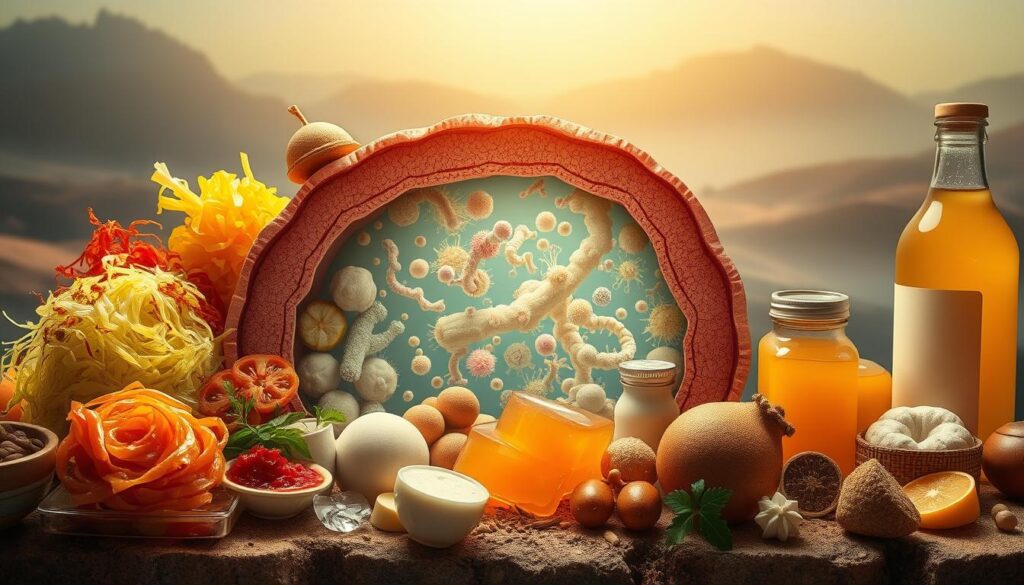
Benefits of Sauerkraut and Kimchi
Sauerkraut and kimchi are made by fermenting vegetables with lactic acid bacteria. This process adds probiotics to your diet. For live cultures, choose unpasteurized versions. Add small amounts to salads, sandwiches, or as a side dish.
- Live cultures: Enhance gut diversity
- Vitamin boost: Rich in vitamin C and K
- Easy to make: Home recipes cut costs and maximize freshness
Delicious Yogurt Recipes
Plain Greek or plant-based yogurt is great for gut-nourishing recipes. Here are three ideas:
| Recipe | Ingredients | Benefits |
|---|---|---|
| Cucumber Yogurt Soup | Plain yogurt, diced cucumber, dill, lemon juice | Cools inflammation; aids digestion |
| Mediterranean Dip | Yogurt, garlic, olive oil, herbs | Supports gut lining integrity |
| Overnight Parfait | Yogurt layered with berries and nuts | Adds fiber to feed your gut microbiota |
Pair these recipes with whole grains and veggies for better results. See how your body reacts and adjust the amounts. Small, consistent steps make these foods a key part of your gut health plan.
Mindful Eating for Gut Health
Every bite you take is important, not just for taste but for digestion. A good gut-healthy eating plan includes mindful eating. Small changes in eating habits can greatly improve your digestive health meal plan.
The Power of Slow Eating
Eating slowly helps your brain know when you’re full, stopping overeating. Here are some tips to eat slower:
- Chew each mouthful 20-30 times to break down food properly.
- Pause between bites and set utensils down to avoid rushing.
- Turn off screens to focus on the flavors and textures of meals.
Strategies to Reduce Stress During Meals
Stress can slow down digestion and nutrient absorption. To relax before eating, try these:
- Inhaling deeply for 5 minutes to activate the parasympathetic nervous system.
- Expressing gratitude aloud or in a journal before meals.
- Choosing calm environments—avoid eating in high-pressure settings.
These mindful steps can greatly improve how your body absorbs nutrients. Small changes can lead to big improvements over time.
Monitoring Your Gut Health Progress
🌿 Discover the Benefits of Moringa!
![]()
Keeping track of your gut health is key. Start a journal to note meals, symptoms, and energy changes. Look for bloating, energy drops, or mood swings within two hours of eating.
Apps like MyFitnessPal or Cronometer make tracking easier. They have food diary features to help you stay on track.
Tracking with Purpose
- Track fiber intake and note digestion ease post-meals
- Compare sleep patterns with probiotic-rich food consumption
- Use emojis or color codes to mark discomfort levels quickly
Signs of Progress
Positive changes may take time. Look for these signs:
- Regular bowel movements without straining
- Reduced sugar cravings as gut bacteria balance improves
- Improved skin clarity reflecting reduced inflammation
- Sustained energy levels without midday crashes
Remember, healing times vary. If bloating lasts after two weeks, try different fiber sources or see a dietitian. Celebrate small victories like better sleep or clearer thinking. They show your body is adapting to healthier habits.
Consulting with a Healthcare Professional
I’ve shared a meal plan for gut health, but everyone is different. It’s important to talk to a healthcare provider to make sure it’s right for you.
When to Seek Guidance
If you still have digestive problems after trying the meal plan, get help. Signs like constant bloating or losing weight without trying might need a doctor’s check-up. If you have IBS or IBD, or if your meds affect your digestion, see a doctor right away.
Understanding Individual Needs for Gut Health
Healthcare experts can give you personalized advice. A gastroenterologist can look into long-term symptoms, while a dietitian can tweak your diet. Tests like stool analysis or food sensitivity tests can find what’s causing your issues. Some insurance might cover these, so ask your doctor about it.
Getting professional advice helps avoid too many food limits. Working with experts makes sure your diet plan is good for your long-term health. I suggest talking to a specialist to make your diet better and improve your gut health.
FAQ
What is a gut-friendly meal plan?
Why is gut health important for overall well-being?
Can I create a meal plan for gut health on a budget?
What are some good gut foods to include in my meal plan?
How can I incorporate probiotics into my diet?
What are the signs of a healthy gut?
Is it necessary to avoid all processed foods for a healthy gut?
How can I diagnose potential food sensitivities?
What is the best way to stay hydrated for gut health?
Did you like this article? See also: https://powerfitguide.com/foods-that-help-control-cholesterol-lower-your-cholesterol/

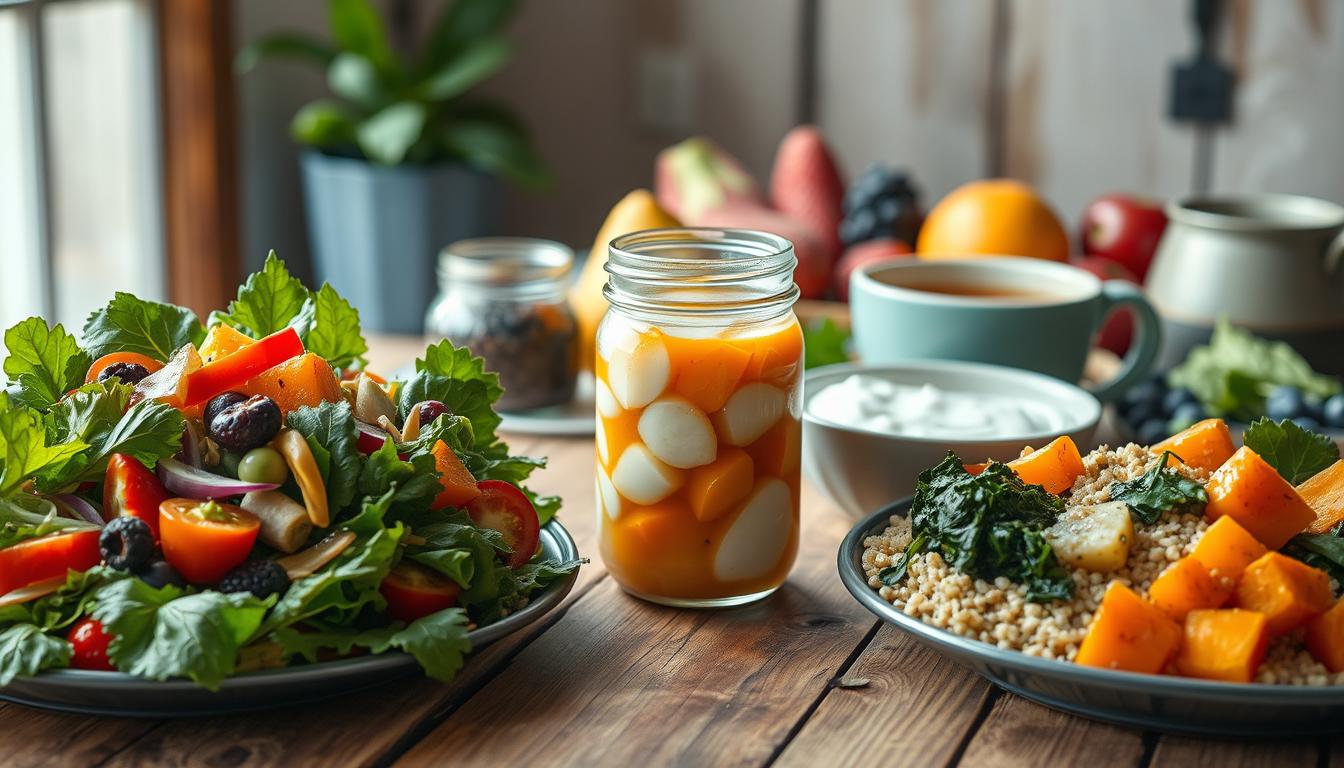


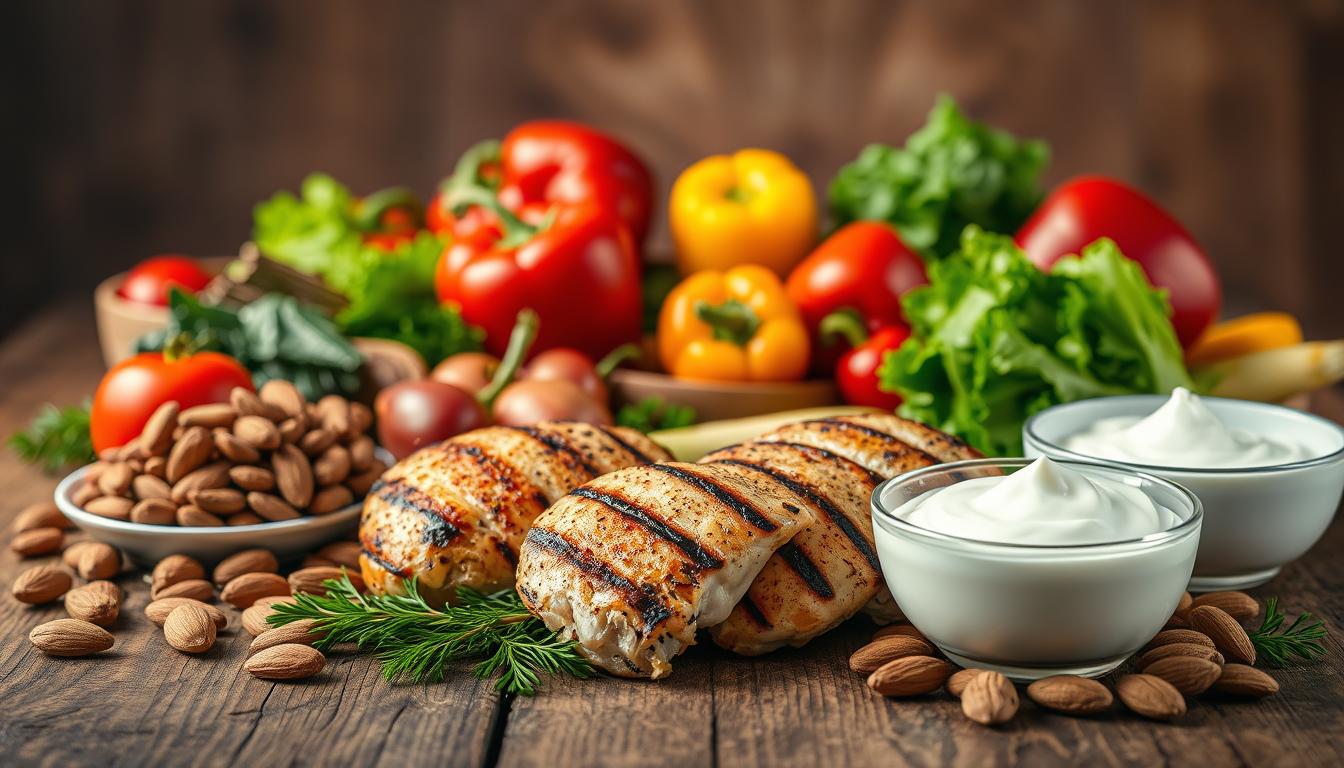

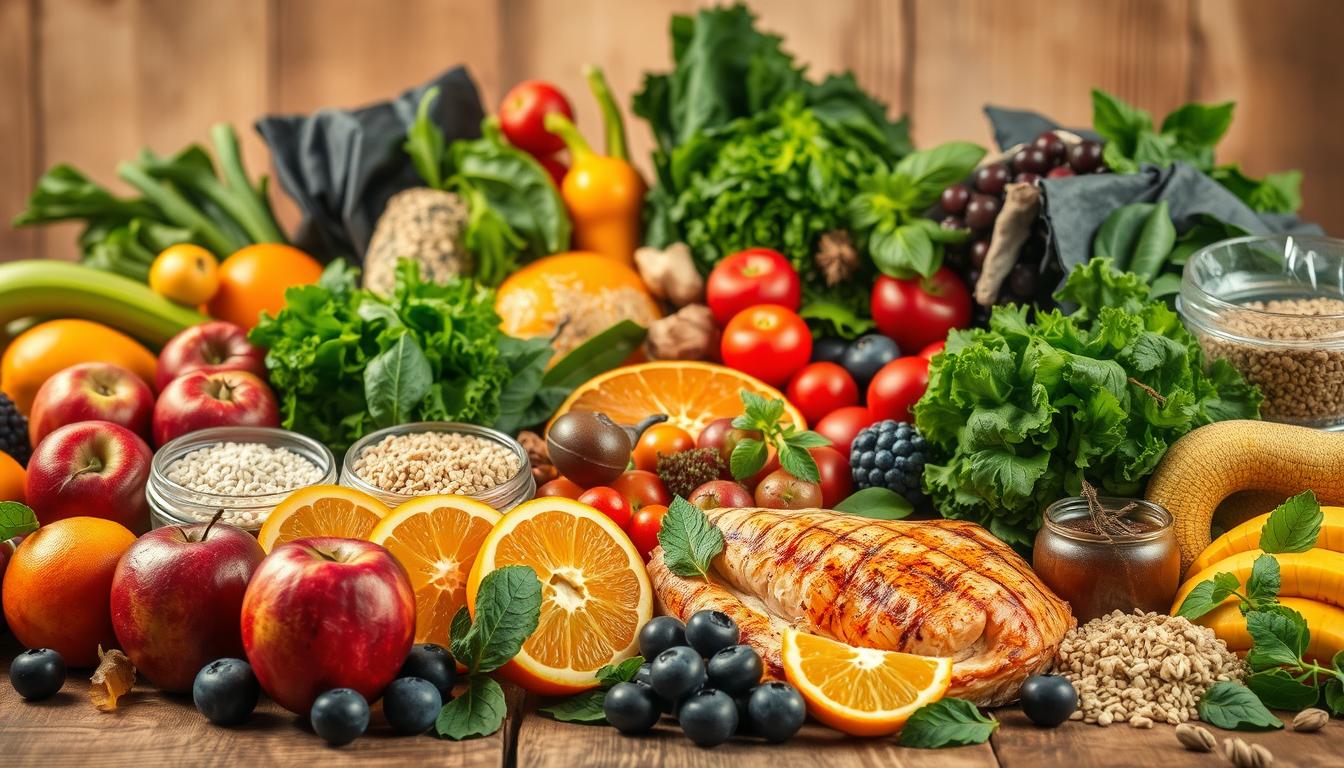
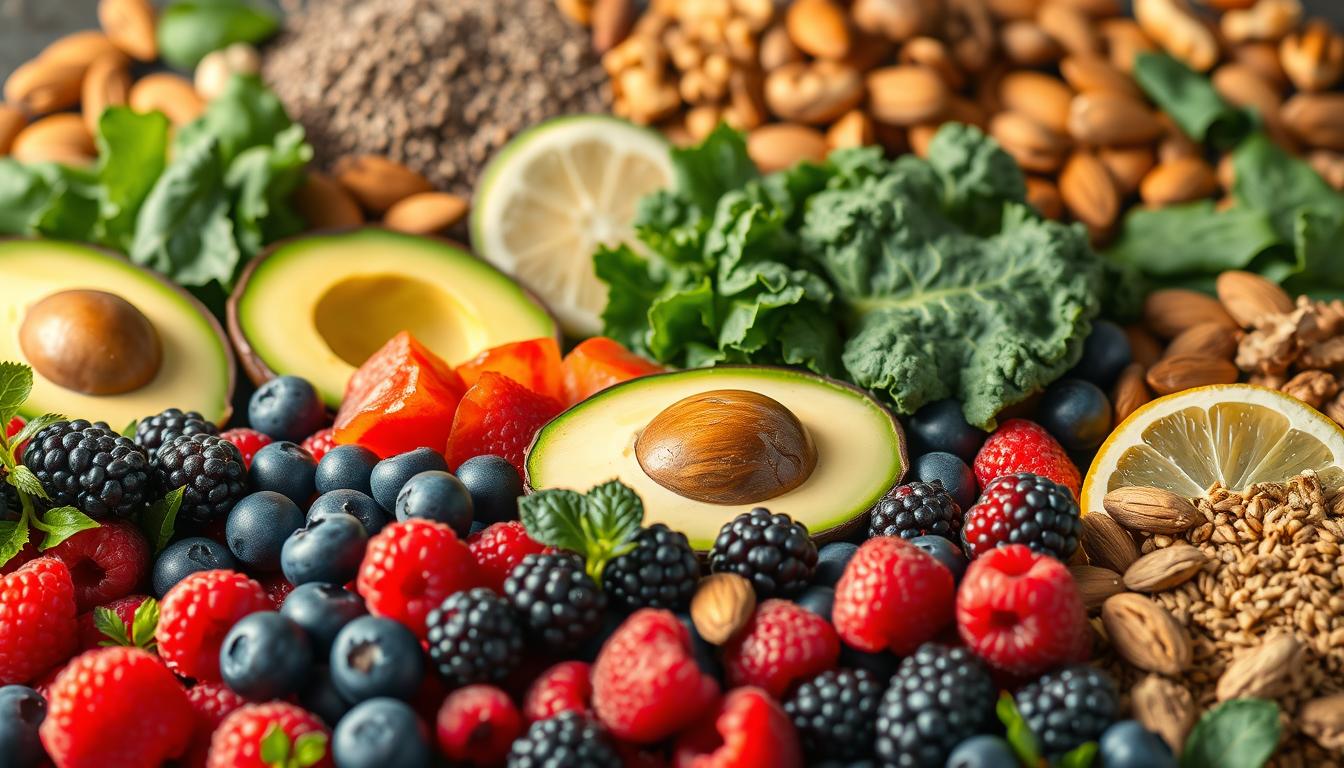
Comment on “Meal Plan for Gut Health”